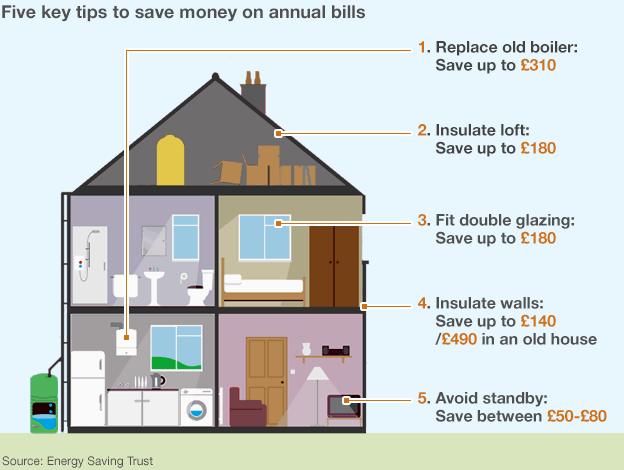Campaigners lobby David Cameron over cold homes
- Published
- comments
Campaigner Ed Matthews says long-term solutions are needed as Britain has "the worst insulated housing stock in Western Europe"
Fuel poverty campaigners have written to Prime Minister David Cameron demanding cross-party action on the "national crisis" of cold homes.
Campaigners said the UK was second only to Estonia for people struggling to pay their energy bills across Europe.
It came as Public Health England urged people to keep their homes well heated this winter to avoid potentially fatal health problems.
It said living rooms should be 21C (70F) and other home areas 18C (65F).
Campaign group Energy Bill Revolution - an alliance of charities including Age UK and Barnardos - said the biggest problem in the UK was "leaky homes" and called for investment in a domestic insulation programme.
Energy Bill Revolution said "woeful" levels of insulation had left Britain falling way behind comparable European countries such as Sweden, Germany and the Netherlands.
Campaign director Ed Matthew said: "Our political leaders are falling over themselves to come up with headline-grabbing ways to cut energy bills yet they fall woefully short of a true solution to the energy bill crisis.
"By far the biggest opportunity to cut energy bills is to fully insulate the UK's leaky homes. No other investment can do so much for so many. If the government is serious about solving this crisis they must make insulating homes the UK's number one infrastructure priority."
Increasingly anxious
Public Health England's advice came in its Cold Weather Plan, external for 2013, after four of the big six energy companies announced price rises.
Age UK said older people in particular were increasingly anxious about the cost of heating their homes.
Winter health risks range from flu to falls - but the cold can also make heart and respiratory problems much worse.
On average there are about 24,000 excess winter deaths in England each year, many of which experts say are preventable.
The plan has been produced in collaboration with the Department of Health, NHS England and the Local Government Association.
It contains advice for the NHS and local government, as well as individuals.
This includes having your flu vaccination if you are in an at-risk group, ensuring homes are properly insulated and making sure heating systems are routinely checked.
From November, the Met Office will issue cold weather alerts if the temperature dips to 2C (35F) or less, or if there is severe winter weather such as heavy snow or widespread ice.
'Stay warm'
Dr Paul Cosford, director for health protection and medical director at Public Health England, said: "In colder weather, keeping yourself warm is essential to staying healthy, especially for the very young, older people or those with a chronic condition such as heart disease and asthma."
Public health minister Jane Ellison said: "The elderly and those with long-term illnesses are particularly at risk during winter months so it's crucial that people stay warm."
Age UK's charity director Caroline Abrahams said: "Being cold is a huge health risk for older people so it is absolutely essential that older people stay warm during the winter months.
"But with fuel poverty blighting the lives of millions of households in the UK many older people are feeling increasingly anxious about the rising cost of energy.
"The government must show it has a clear long-term plan to make low income homes more energy efficient."
Labour's shadow energy and climate change minister, Jonathan Reynolds, said: "People are being left in real hardship because David Cameron won't stand up to the energy companies.
"Britain's energy is market is not working for families and business."

- Published25 October 2013
- Published24 October 2013
- Published24 October 2013
- Published29 November 2012
- Published25 October 2013
- Published22 November 2012